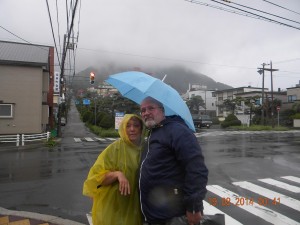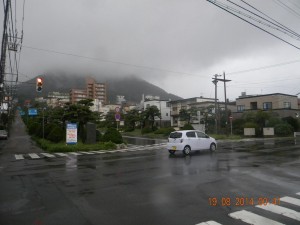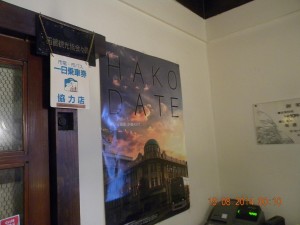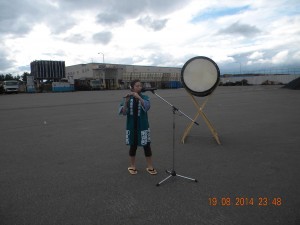 Over Island Hokkaido seemed to be overcast all the way to its third biggest after Sapporo and Asahikawa city of Hakodate, located on Oshima peninsular.
Over Island Hokkaido seemed to be overcast all the way to its third biggest after Sapporo and Asahikawa city of Hakodate, located on Oshima peninsular.
In spite of heavy rain we dressed ourselves in yellow raincoats for this occasion plus umbrellas for protection and looked pretty imposant, bravely stepped out of the ship.
Hakodate looked spooky: mount Hakodate of 334 m height, a lumpy, forested mountain, was half covered with floating white clouds without invitation to visit its summit neither by hiking trail, nor cable car, or car.The obscure local nickname of the bumpy mountain is Gagyuzan (Mount Cow’s Back), alluding to the way the mountain resembles a resting cow.
But, today : “Bye-bye! Resting Cow! We won’t go close to you, it’s not interesting at all.”
Instead, we are heading along the streets, hopping on and off the street cars, watching the monument to the notable man of the city : Kikutaro Takanashi. Have you ever seen poem monument to anybody? Here it is of Kikutaro Takanashi:
“Takahashi Kikutaro joined Hakodate Daily Newspaper Co. in 1922. He wrote poems, novels and plays, while working as a chief of both local news department and the art and science department.
 In 1931, he wrote the words of the song “Sake Doth Move Us to Tears or Sighs…” for Columbia Records Co. and it was accepted.The music was composed by Koga Masao and Fujiyama Ichiro and it became a big hit. In 1933, he became a songwriter under an exclusive contract with Columbia Records Co. Later he
In 1931, he wrote the words of the song “Sake Doth Move Us to Tears or Sighs…” for Columbia Records Co. and it was accepted.The music was composed by Koga Masao and Fujiyama Ichiro and it became a big hit. In 1933, he became a songwriter under an exclusive contract with Columbia Records Co. Later he  changed to King Records Co. and he wrote about 3.000 lyrics until he died in April, 1970 at the age of 69.
changed to King Records Co. and he wrote about 3.000 lyrics until he died in April, 1970 at the age of 69.
He wrote many popular songs such as “Don’t Coo Little Dove”, Rain on the Avenue”, “Here is my Happiness”, “An Inn on the Heights”, and “Flowers Blooming in the Rain”, among the others.
This monument was built by his fans at Horaich Hot Springs in 1961 to commemorate his song “Sake Doth Move Us to Tears or Sighs…” which was written in Hakodate. It was moved to the present site in April, 1998. The epigraph was written by Takahashi himself”.
It’s a pleasure to see that the nation honors its poets.
I noticed the poetic soul of Japanese people just around the corner when we entered the “Hi-shi” cafe where some of our group were focusing on buying and trying kimonos, and some comforted themselves drinking the traditional Japanese tea with a piece of sponge tart. What a delicious thing it was, believe me.
Coming back to the ship, we saw a Japanese girl playing flute and drums. The rain stopped and the sound of music was caressing you as if wrapping up in gentleness and asking about forgiveness for bad weather which could spoil your inquisitive tourist mood.
Thanks, girl. You have really cheered us up.
Listen: “Traditional Japanese Modern Music” Lead Singer: Yuko Suzuhana